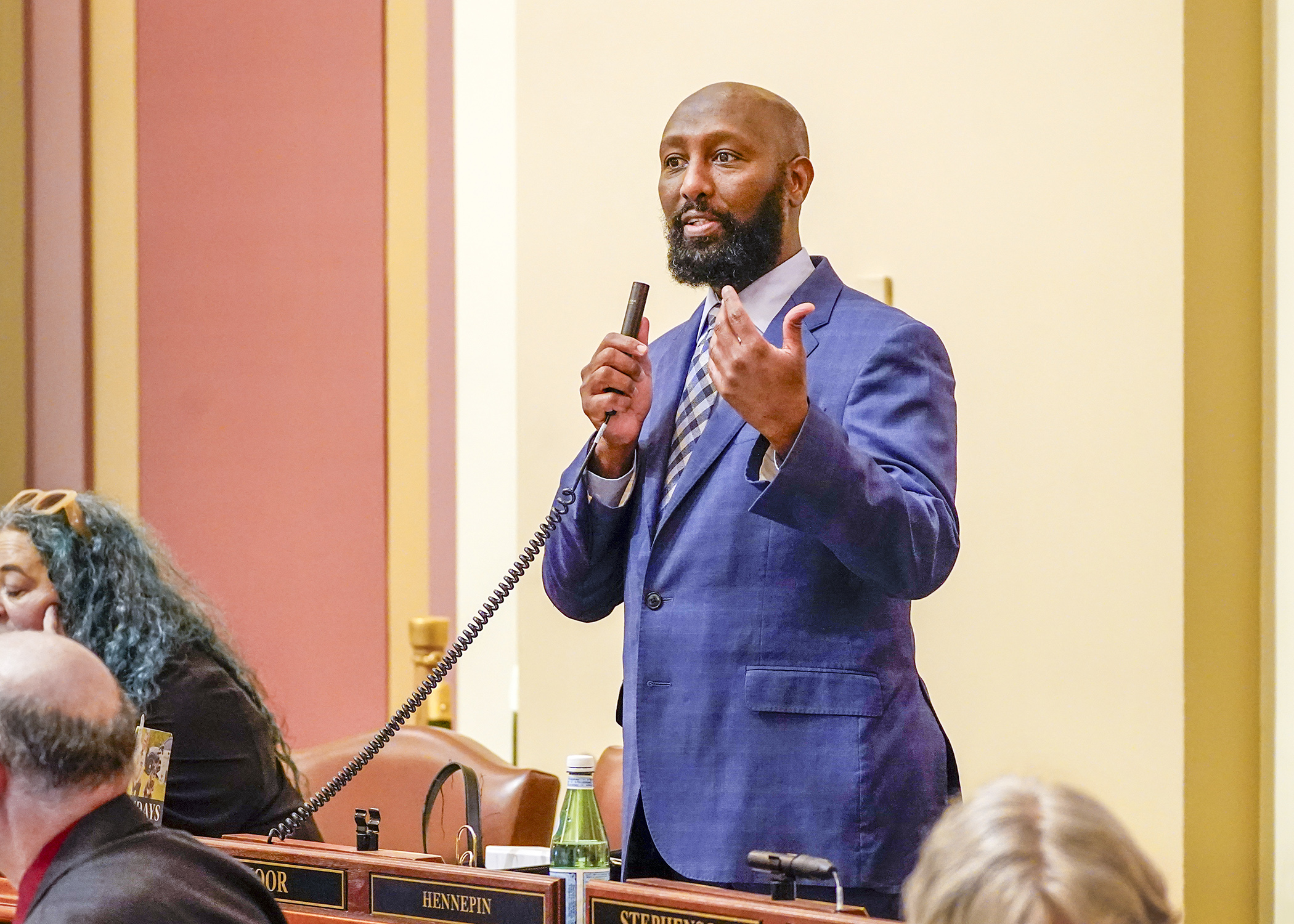House passes human services budget bill; conference committee likely next

Financial support of nursing homes. The illegal drug crisis in the United States. Open positions at the Department of Human Services. All were debated on the House Floor Monday during a nearly seven-hour debate before passage of the human services supplemental budget bill.
Sponsored by Rep. Mohamud Noor (DFL-Mpls) and Sen. John Hoffman (DFL-Champlin), HF5280/SF5335*, as amended, would appropriate $42.13 million in the current biennium and $14.86 million in the 2026-27 biennium for programs related to disability services, aging services, substance use disorder services, priority admissions and civil commitment, and direct care and treatment.
[MORE: Download the spreadsheet]
The House passed the bill 70-59. It now heads back to the Senate where its version passed 53-13 on April 30. A conference committee will likely need to work out the differences.
Noor said the bill would create an Office of Homelessness, keep Carlton Care open, and invest $7.69 million in aging services through a loan program for long-term services and supports. It would also adopt a new priority admissions framework for civilly committed individuals residing in jails or hospitals due to the lack of specialized facility beds. And it would create a program to enroll incarcerated individuals in Medicare before they are released to support a more successful re-entry into their community.
“This builds on what we did last year — the historic investment, the transformative investment we made,” Noor said. “Quite frankly, it’s about saving lives.”
Substance use disorder services
An amendment that would have prohibited the repeal of a July 1, 2031, sunset clause to the Opiate Epidemic Response Fund was not adopted. Created in 2019 with money from a settlement with opioids distributors and manufacturers, the fund, in part, appropriates money to prevention and treatment programs.
Rep. Dave Baker (R-Willmar) said the sunset clause was instrumental in the settlement agreement. His amendment was not about the money, but rather about “sticking with our word and our promise that in 2031 we should take a look at this again.”
“The pharmaceutical companies are doing just fine,” said Rep. Aisha Gomez (DFL-Mpls). “They can afford to help us pay for the destruction that they have wrought and the idea that we would let them off the hook when our kids have died is just unconscionable.”
Rep. Peggy Scott (R-Andover) and other Republicans said the bigger problem is the fluid United States/Mexico border that allows drugs manufactured in China to reach all corners of the country.
Members overwhelmingly approved an amendment to increase reimbursement rates by 3% for substance use disorder providers. Noor said it’d be funded by the newly created $2 million human services response contingency account.
The House also approved an amendment to appropriate $500,000 from the same contingency account to fund Hennepin County youth recovery services. The original bill called for funding such services from the Opiate Epidemic Response Fund.
Department of Human Services
The Department of Human Services came under scrutiny through three amendments, all of which failed.
One would have reappropriated the $2 million human services response contingency account to a third-party vendor to examine financial and grant oversight, policies, and management at the Department of Human Services.
Two amendments would have mandated a report on unfilled positions at the department and the amount of unused office space at owned and leased office buildings reserved for state agencies. Noor said the budget reappropriates $2.44 million the department has not used to hire employees.
Aging services
Republicans submitted six amendments on matters related to the Department of Human Services’ aging services programs. None were adopted.
They would have:
- limited a long-term care grant/loan program to financially distressed nursing facilities only, rather than assisted living care facilities and other aging facilities;
- left that loan program in place until such a time as no nursing home is under state receivership;
- provided a temporary $12.35 rate add-on per resident day for nursing facilities until June 30, 2025;
- used the $2 million human services response contingency account to fund grants for rural emergency medical services providers grant program;
- used the $2 million human services response contingency account for grants to nursing facilities for costs of meeting federal minimum staffing standards; and
- allowed distressed nursing homes to be exempt from employment standards set by the Nursing Home Workforce Standards Board.
“These nursing homes are barely hanging on as it is,” Baker said. “What we need to do is give them some time, a breath.”
Related Articles
Search Session Daily
Advanced Search OptionsPriority Dailies
Speaker Emerita Melissa Hortman, husband killed in attack
By HPIS Staff House Speaker Emerita Melissa Hortman (DFL-Brooklyn Park) and her husband, Mark, were fatally shot in their home early Saturday morning.
Gov. Tim Walz announced the news dur...
House Speaker Emerita Melissa Hortman (DFL-Brooklyn Park) and her husband, Mark, were fatally shot in their home early Saturday morning.
Gov. Tim Walz announced the news dur...
Lawmakers deliver budget bills to governor's desk in one-day special session
By Mike Cook About that talk of needing all 21 hours left in a legislative day to complete a special session?
House members were more than up to the challenge Monday. Beginning at 10 a.m...
About that talk of needing all 21 hours left in a legislative day to complete a special session?
House members were more than up to the challenge Monday. Beginning at 10 a.m...